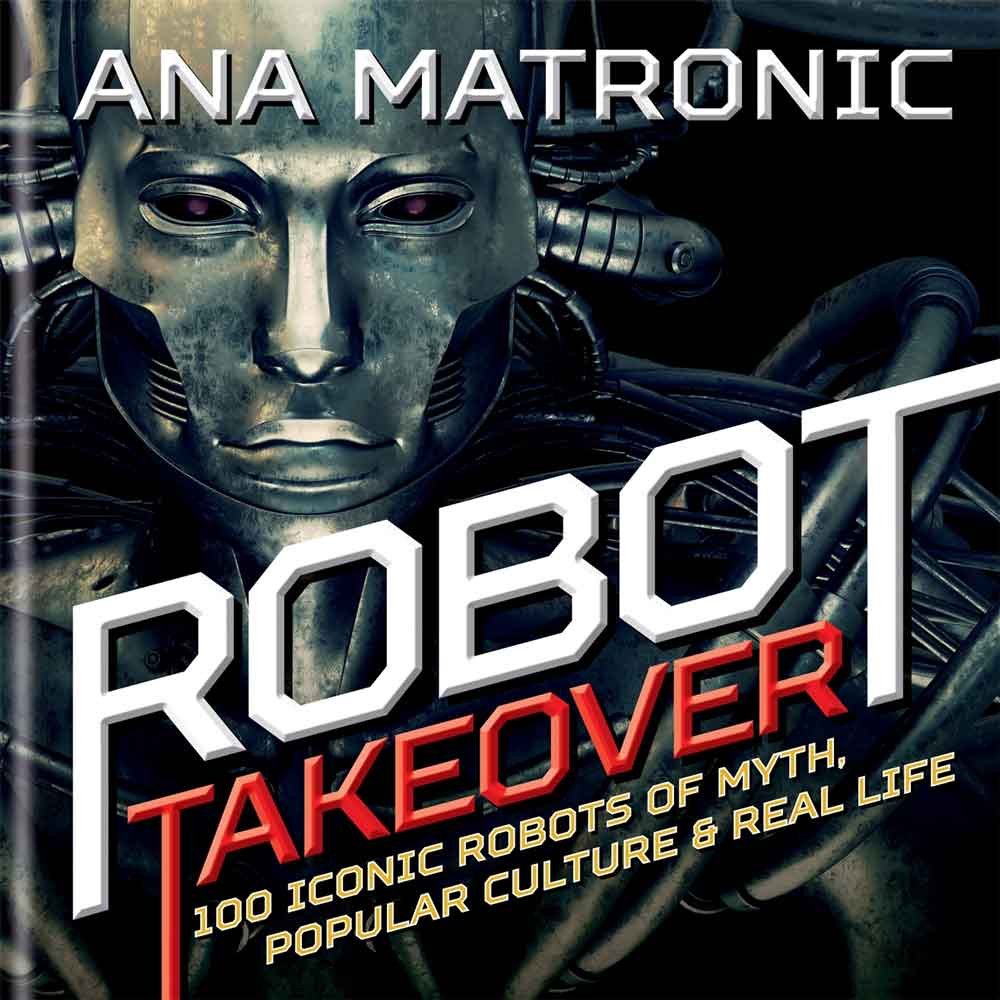As a child in Portland in the 1970s, “chubby little kid” Ana Lynch thought it seemed thoroughly feasible that she’d grow up to visit distant galaxies with a trusty robot companion at her side. From the heady vantage point of 2015, it’s clear that technology didn’t quite keep pace with her ambition. While robots can now defuse bombs, explore shipwrecks and even explore distant planets (on their own), the sort of human-robot interaction you’d get from Star Wars’ C-3PO, Star Trek’s Data or even the foul-mouthed Bender from Futurama remains a long way off.
Nonetheless, Ana found creative ways to channel her droid inspiration. As the fierce frontwoman of Scissor Sisters, sci-fi inspired her stage persona — Ana Matronic — and she has written her robot obsession on her skin in the form of a spectacular circuitry tattoo on her shoulder. A voracious reader and fan of “head-explodey” science, she’s consumed multitudinous novels, comics, music, art and film about robots.
All the while, she has remained hopeful that her droid companion might be around the corner. “The interface between human and artificial intelligence is so exciting right now,” she enthuses, speaking from London, where she’s been standing in on BBC Radio 2. “There’s lots of new stuff coming out. Every day you hear something new.”
This month, Ana’s lifelong fascination takes shape in a witty and accessible book. “Robot Takeover” is a tour through 100 iconic robots from Maria in Fritz Lang’s Metropolis through Interstellar’s TARS, Doctor Who’s Daleks, Blade Runner’s Replicants and Pixar’s Wall-E. It even takes in robotic influences on music (including Janelle Monáe, Kraftwerk) and fashion (Alexander McQueen, Thierry Mugler).
“I really wanted to be as comprehensive as possible,” she explains. “If you’re going to talk about robots, you can’t just talk about the ones in movies, books and comic books, you have to talk about music. There’s robots everywhere in music. There’s robot dances, there’s robotic fashion. Everything. It’s everywhere. It’s a really universal symbol.”
The final section of the book examines some of the latest real-world developments in robotics, including the uncanny BINA48. A robot version of its developer, Martine Rothblatt’s wife, BINA48 points to a future when we might be able to upload all our thoughts and feelings to a machine.
For Ana, it’s unsurprising that more and more people are coming to share her interest in the robotic. “As our society becomes more technological, it is more normal to have stories about the interface of technology and humanity,” she explains.
A side effect of this mainstreaming, Ana believes, is that sci-fi might be starting to come to terms with its deep-seated historic gender difficulties.
“Of all the female robots in the book, only two of them are not sexy. Only two!” she laments. “And those two are made for care — Rosie the Robot from the Jetsons and the Electric Grandmother from Ray Bradbury — so they still represent a matronly physical ideal.”
The concern is timely in a week when the ongoing battle for sci-fi’s soul hits the news again, as the top fan-awarded prizes in the genre, the Hugos (past winners: Isaac Asimov, Arthur C. Clarke, Philip K. Dick), are riven with controversy over a group of white, male authors and their followers, the “Sad Puppies” and “Rabid Puppies,” who claim that the awards’ growing diversity of writers is a victory for “social justice warriors” over storytelling. The Puppies’ King Canute-style mission to halt the tide of new voices — which includes different races, sexualities and, heaven forbid, even women — is halted only when “no award” is declared in five categories they’d attempted to rig.
Futuristic the stories may be, but a section of the sci-fi community is clearly still stuck somewhere in the last century.
“Sure, that’s fiction in general,” Ana agrees. “And it’s really the world in general. The world up until now has been run by one kind of person and one color person, and one gender of person. Now we’re getting the more nuanced voices.”
As evidence, she points to Janelle Monáe’s examination of the parallels between the robot “other” and the African-American history of slavery, as well as writer Daniel H. Wilson, a doctor of robotics and member of the Cherokee Nation whose Robopocalypse sees Native Americans lead the fight back for humanity.
“I find this time that we’re in a very exciting one for new voices. I’m really interested to see what comes out,” she adds.
As a feminist, passionate ally of the LGBT community, and an outspoken liberal, Ana has always been politically engaged. She’s unlikely to be too upset at being lumped in with the “social justice warriors,” even if it was supposed to be an insult.
From her home in Brooklyn, where she lives with her husband, video artist Seth Kirby, she’s been following the current presidential campaigns closely. “I do think Hillary (Clinton) has everything it takes to win and to be president. I thought that last time she ran as well. I think even more so now.”
But as she watches her city’s problem with homelessness grow — in recent years, homelessness in New York City has reached the highest levels since the Great Depression of the 1930s — and the ongoing controversy around the #BlackLivesMatter movement, Ana says she’s primarily focusing her energies closer to home.
“I am definitely going to vote and be involved in watching the presidential debates,” she continues, “but I’m kind of more focused on my community. I really feel like the time is now for me — and for everybody — to get really involved in their communities.”
Contrary to popular opinion, she claims that most New Yorkers aren’t “rude and brash and mean.” They’re generous and they care about their vibrant city. But the so-called melting pot of cultures that has made NYC a magnet for creatives is under threat.
“It’s really difficult because Manhattan is getting more and more expensive and it’s getting harder and harder to live there. Obviously that is affecting the demographic; it’s affecting the culture of the city, and the identity of the city,” she argues. “We have to keep New York a melting pot. It has to stay that way. It’s not New York if it isn’t.”
For Ana, local action includes volunteering at the LGBT-friendly Harvey Milk High School and continuing her policy of giving to charities (Scissor Sisters always give donations to local charities in the cities where they play). She was also in Ireland in June to celebrate Pride, just after they’d voted in marriage equality.
“It was a really fantastic day, she says. “The Supreme Court announcement had just been made in the U.S. about gay marriage. Seeing the White House lit up in the colors of the rainbow flag still chokes me up.
“But the fact that Ireland put it to a vote and it won is so much more significant. It’s one thing for a group of old people in robes to sit around and decide the fate of a nation, but the fact that people got out and did that speaks so much to the beauty of the Irish people.”
Among the campaigning, DJing, and her new career as an author, Ana says she will also find time to get some music out soon. Scissor Sisters remain on hiatus (“I don’t think we’re on hiatus for good”) but she’s got a solo record, produced along with her husband, in the works. “It has been good working with him,” she says. “He’s really good at things that I’m not good at, and vice versa. We really like working together.”
First she’s got her book launch party, at London gay super-pub The Glory, to prepare for.
“I think I know what I’m wearing, but it’s not very roboty,” she muses. “I’m wondering if I need to go and get a Dalek costume or something … EXTERMINATE!”
Courtesy of the INSP News Service — www.INSP.ngo



